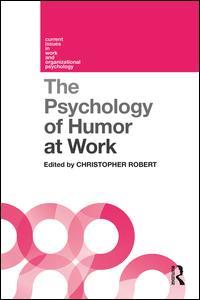Description
The Psychology of Humor at Work
Current Issues in Work and Organizational Psychology Series
Coordinator: Robert Christopher
Language: English
Subject for The Psychology of Humor at Work:
Keywords
Workplace Humor; humor; Humor Styles; humour; Leader Humor; leadership; Aggressive Humor; coping; Vice Versa; stress; Positive Humor; self-regulation; Affiliative Humor; socialization; Hospital Clown; creativity; Negative Humor; satire; Humor Behavior; slaptstick; Humor Type; comedy; Self-defeating Humor; laughter; Humor Consultants; laughing; Social Network Role; workplace; Similar Measurement Properties; psychology; Recruiter Behaviors; Humor Expression; Job Search Behaviors; Humor Enactment; Hedonic Tone; Job Search Process; Workplace Fun; STI; Job Search; Humor Patterns
Publication date: 03-2019
· 15.6x23.4 cm · Paperback
Publication date: 12-2016
· 15.6x23.4 cm · Hardback
Description
/li>Contents
/li>Readership
/li>Biography
/li>
This is the first book to look at the psychological processes that enable humor to affect people and teams in the workplace. It recognizes that humor plays many roles beyond making people feel happier and more productive, and acknowledges humor?s potential darker side as well.
Bringing together a small but growing field of study, the book features chapters around core psychological topics such perception, creativity and stress, while also addressing organizational issues such as leadership, teamwork, and social networks. The collection concludes with chapters on the role of humor in recruitment processes, as well as how humor consultants work with organizations.
Each chapter in The Psychology of Humor at Work not only provides a comprehensive review of what is known in that area, but also considers future directions for research and practice. It will prove fascinating reading for students, practitioners and researchers in organizational psychology, HRM, and business and management.
List of contributors 1. Humor at work: Often experienced, seldom studied 2. Humor and Leadership 3. Humor and person perception 4. Humor and organizational networks: Functions and dysfunctions 5. Humor and creativity6. Humor, stress, and coping 7. Humor in workgroups and teams8. Humor in job search and recruitment9. Humor consulting 10. Paradoxes in workplace humor research: Theory, culture, and the messy work of moving forward. Index
Christopher Robert is an Associate Professor of Management in the Trulaske College of Business at the University of Missouri, Columbia. His research focuses on humor at work, as well as cross-cultural management, work groups and teams, and conflict.




